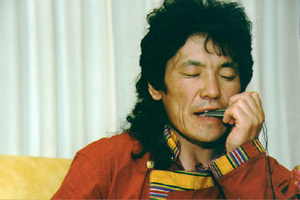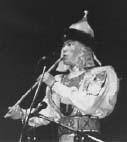|
- Catalog (in stock)
- Back-Catalog
- Mail Order
- Online Order
- Sounds
- Instruments
- Projects
- History Face
- ten years 87-97
- Review Face
- our friends
- Albis Face
- Albis - Photos
- Albis Work
- Links
- Home
- Contact
- Profil YouTube
- Overton Network
P & C December 1998
- Face Music / Albi
- last update 03-2016
|
1. Oh, Kosyim - (music: Nohon, text: N. Ulagashev) - 9:41
2. Blessing to Altay - (Trad.) - 2:51
3. Beard - (Trad.) - 1:29
4. Maadai Kara - (Trad.) - 6:54
5. Alatay - (Trad.) - 1:53
6. Altin Kel - (Trad.) - 3:20
7. Ak-Burkhan - (music: Nohon, text: E. Chapiev) - 3:28
8. When will baatyrs rise? - (music: Nohon, text: Nohon) - 3.20
9. World axis - (music: Nohon, text: Sh. Shatinov) - 4:01
10. Snake's lullaby - (music: Nohon, text: Trad.) - 3:04
11. Bear's lullaby - (music: Nohon, text: Trad.) - 2:15
12. The call of the forefathers - (music: Bolot & Nohon) - 9:21
13. Morning in the mountains - (music: Bolot) - 2:26
14. Dance of cranes - (music: Bolot & Nohon) - 3:51
15. Kadyn - (music: Bolot & Nohon) - 2:13
16. Parting - (music: Bolot, text: Bolot) - 2:43
17. Chu, chu, chu - (music: Nohon, text: S. Chapiev) - 1:16
18. Blessing to the peak of the Üch Sümer - (Trad.) - 3:18
Songs:
1. Oh, Kosyjm - music: N. Shumarov, text: N. Ulagashev
- topshur, kai, singing: Nohon - komus, karkiraa: Bolot
|
This is a song from the big epic "Kozuike and Baian". A son goes to foreign countries to look for his bride, who left with her parents.
|
- Mother's song:
What will my son do if an infuriated bear comes out of the thick forest where a horse can't pass through?
What will my son do if a wolf in white rage comes out of the thick forest where a hailstone can't fall on the ground?
|
- Son answers:
If the bear comes out, I have a poison arrow for it,
If the wolf comes out, I have a well-aimed arrow for it,
|
- Mother:
There will be formidable foreign tears, you'll be quite alone like a falcon in the sky. Shall I die of grief and tears?
|
- Son:
I'll overpower formidable foreign tears, I have sharpness of wit. You will not die of grief, you will live in gladness.
|
2. Blessing to Altay - (Trad.)
- topshur, singing: Nohon - komus, singing: Bolot
|
I wore strong leather high-boots, my Altay / In bloody times I saved my life, my Altay / I wore beautiful suede high-boots, my Altay / In severy years you saved my life, my Altay / I pray to your passes, my Altay / I bow before your rivers, my Altay.
|
3. Beard - (Trad.)
- topshur, shatra, singing: Bolot - komus, singing: Nohon |
The thick beard is sparkling from butter, black beard, long beard. / I give him food, the beard doesn't eat. I give him butter, the beard doesn't see it. / I pull hall, the beard doesn't get up, the beard doesn't even listen to any words.
|
4. Maadai-Kara - (Trad.)
- topshur, kai: Bolot and Nohon
|
Having raised the dust of the earth to heaven, having sent hail and thunder, the war is coming. The fangs are chattering as a fire-spitting dragon. This is Kara-Kula, the villain, coming with war to the Altay native land.
|
- Maadai:
While I have become a powerless old man and my amber has become dead jade, you have come with the war, having waited till my old age. So take away my cattle and herd, but don't take captive my peaceful people to no purpose.
|
- Kara-Kula:
I'll destroy your homes, ravage your land, cut your cattle. I'll drive your people into slavery and make them work. And you, old man, will be watchman in my home. I'll force you to guard my cattle.
|
5. Alatay - (Trad.)
- singing: Bolot
|
Moonlight was twinkling like plait when my racer-ambler danced, my Altay.
Eyebrows were sparkling like half-moon while altay girls danced, my Altay.
Silver trees is twinkling, my fast horse dashes off, oh, my Altay.
The girls'faces are glaring like the sun, they dance, oh, my Altay.
|
6. Altin Kel - (Trad.)
- singing: Bolot
|
If one takes a glance at you from above you are like a mirror, my Gold lake. If one takes a glance at you from the side your edges aren't seen, my Altin Kel.
|
| High snow-topped summits guard like an armour. |
You will be always pure and in harmony for ever and ever, my Gold Lake.
|
7. Ak-Burkhan - music: N. Shumarov, text: E. Chapiev
- topshur, singing: Nohon
|
Golden peaks and mountains, seething pure rivers give me strength and wisdom, give me freedom and eternity.
Give sick men medicinal herbs and spring water and strength, youth to the old.
Help humble folk and weak children to become independent, my Altay.
Black fog is descending on the dale, fire and flame are flaring up.
Save my exterminated and weak people of heartless, brainless dears and sovereigns, save us, oh, my Altay.
|
8. When will baatyrs (heroes in Altay folklore) rise? - music and text: N. Shumarov
- topshur, singing: Nohon - karkiraa: Bolot
|
When will my few people be numerous and sage?
When will my exterminated and oppressed people be free?
When will baatyrs rise from barrows?
When will medicinal herbs grow in vales instead of tall weeds overgrown?
When will evergreen trees grow on the ground, having been trampled down by horses' hoofs?
When will my humble and oppressed people live with their head held high?
|
9. World axis - music: N. Shumarov, text: Sh. Shatinov
- topshur, singing: Nohon - karkiraa: Bolot
|
I come from past ages, I have learned guttural singing from the rumble of the sky, from the whisper of mountains. I thought the moon was heaven's axis and God the axis of the universe.
But in pitch-dark nights I saw visions and I strove for high ideas and prayers.
|
10. Snake's lullaby - music: N. Shumarov, text: Trad.
- topshur, sikit: Nohon - karkiraa: Bolot
|
Gosling is sweet-heart for goose, lamb is darling for sheep, kitten is sweet-heart for cat, as for me, my baby, my coileet, my ringlet is sweet-heart.
|
11. Bear's lullaby - music: N. Shumarov, text: Trad.
- topshur, karkiraa: Nohon
|
Bye, bye, my dark-haired and shaggy bonny, sleep calmly, fall asleep at snow-covered lair, my affectionate bear-cup, sleep in mother's bosom, snore, my sharp-clawed bonny, bye, bye. You become big and strong. You and spring will wake up, my shaggy and good bonny.
|
12. The call of the forefathers - music: B. Bayrishev and N. Shumarov
- komos, ungurek, kai: Bolot and Nohon
|
13. Morning in the mountains - music: B. Bayrishev
- shoor: Bolot
|
14. Dance of cranes - music: B. Bayrishev and N. Shumarov
- komus, ungurek, shoor: Bolot - komus: Nohon
|
15. Kadyn - music: B. Bayrishev and N. Shumarov
- shoor: Bolot and Nohon
|
16. Parting - music and text: B. Bayrishev
- singing: Bolot
|
Like the sunset you died away and I left with the words "Cheer up". Seeing me off you didn't shed tears, we parted with bitterness. From far away countries I send my kind regards to you. I'll come to you soon.
|
17. Chu, chu, chu - music: N. Shumarov, text: E. Chapiev
- topshur, koomoi: Nohon
|
You jump from the rock to the rock my nimble and fluffy young, chu, chu, chu. When you are chewing bur how beautiful you are, my young.
|
18. Blessing to the peak of the Üch-Sümer (Ak-Sümer) - (Trad.)
- topshur, kai: Nohon
|
Your evergreen leaves don't fall, the wind shakes your trees, my Altay. The songs of Cuckoo never stop, my Altay. Ever white mountains reach the sky and the stars, my Altay. Medicinal herbs and waters as sources of life surround you, my Altay. Washing with rain and water you live for ever, my Altay.
|
Altai means: "Golden Mountains"
The republic of Altai is located in Central Asia and borders on Kazakhstan, China and Mongolia. It is comparable in size with Portugal. The region is dominated by mountains with eternal snow and glaciers, similar to the European Alps. The highest peak, Ak-Sümer is 4'506 metres (nearly 15'000 feet) high. Altai has a population of about 200'000 souls of various nationalities: Altais, Russians and Germans.
The Turkish peoples in Altai were hunters and nomadic shepherds tending sheep, horses and some-times camels. The bequeathed an extremely interesting culture to their descendants, the basic features of which have been handed down from the early beginnings all the way to the present day. One of the most important forms of Altai art, apart from painting and poetry, is the narration of epics in the falsetto voice to the accompaniment of the topshure, a lute-like string instrument. Texts are usually enunciated in the low bass register - throat note singing.
These narratives enjoyed great popularity amongst the people of the steppes. One of the legendary narrators, Deley, knew 77 of them by heart and the longest took seven days and nights. Altai has produced a number of masters of this art, such as N. Ulagashev and P. Kutshiyak and today the tradition is still kept alive by such people as †Aleksei Kalkin, S. Aetenov, Shunu Yalatov, Tovar Tchetsiyakov and †Tanishpai Shinshin.
They preserve a traditional heritage of popular literature and sing of their secret dreams and expectations. These epics contain the aesthetic ideas of this nation in its truest form of expression and tell of the everyday world and the world of spirits and myths. Most of them are pentatonic and melismatics play an important role in the development of the melodies. There are songs of congratulation, for each of the seasons, lullabies, songs for all sorts of animals and even insects, songs of travel, modern philosophical songs, ballads and improvisations. Many are kind of oral philosophy and, at the same time, textbooks designed to guide mankind to a higher level of consciousness.
With "Üch Sümer", a first album is now appearing with two folk-singers from Altai. Bolot Bayrishev and Nohon Shumarov sing of the beauty of their homeland Altai, of the "golden lakes", the Kauny river, the Ak-Sümer (the highest peak in the Altai mountains) and the old "Pasirik" - these are the hill graves where the defenders of the Altai are buried. Then they sing of their people, small though it is in number, and of mankind, nature, the cosmos, and the entity they all form. They open the hidden depths of their souls and combine poetry with music.
One of the oldest legends of these inhabitants of the Altai tells of the origin of the Turkish tribe of Rükü, which is even chronicled in China. The Rükü lived in the southern Altai in the 5th century and mined iron ore. They consisted of 70 brothers, the oldest of whom had been born by a wolf and ruled over the winds and granted blessings. He even had power over summer and winter.
- map sketch Gorno-Altaisk
  
Nohon - Bolot (jew's harp) - Bolot (shoor)
|
